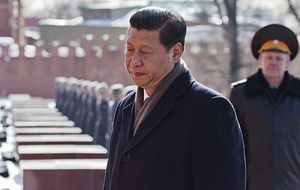All of China is carefully watching to see what will happen to Xi’s anti-corruption campaign this year after a fruitful 2014 which saw the downfall of big “tigers” like Zhou Yongkang, Su Rong, and Ling Jihua. But as Xi himself reminded the public in 2014, the anti-corruption campaign has not yet achieved a decisive victory. Indeed, some quarters of China are still quietly suspicious of the unprecedented efforts of cleaning up China’s “tigers and flies” alike.
Not surprisingly, the spokesperson of Chinese People’s Political Consultative Conference (CPPCC), Lu Xinghua, in an interview said that more tigers would be captured and there is no “iron-cap prince (the untouchable)” before the anti-corruption campaign. Lu became famous last year when he implied that Zhou Yongkang would be brought to justice at the annual meeting of the CPPCC. Since the Chinese term “iron-cap prince” refers to very high level of Chinese leaders, one can only conclude that this year one or several tigers at Zhou Yongkang’s level, or even higher, will be captured in the same way, per Lu’s prediction. If true, this would significantly boost Xi Jinping and Wang Qishan’s efforts to clean up China’s corrupt politics and pave the way for other more pressing and fundamental reforms.
Indeed, one can argue that the main reason why China’s more fundamental reforms are hard to implement, even under Xi’s strong leadership, is because all sorts of corrupt tigers and flies are still resisting reform pressures. Tigers of all stripes might not directly and openly challenge Xi and Wang’s anti-corruption efforts, but they can hide and wait for the right moment to pounce. There are already reports that many government officials now resist reforms by idling in their obligations; some of them even formed alliances to oppose and slow down official investigations.
One particular area where corruption is still rampant is the energy sector. Perhaps this is the reason why the Party has decided to send inspection teams to all strategic central government-owned enterprises. The public has long complained about the monopoly of big strategic firms like China Petroleum and Sinopec which arguably contribute to China’s serious air pollution problems. Zhou Yongkang had controlled many firms in the oil and energy sectors for several decades, and for this reason it is not easy to eradicate all of his influence in a year. Besides, there could be other hidden tigers in the energy sector, waiting to bite back once anti-corruption efforts weaken or even die out. Thus, it is imperative for Xi and Wang to “strike hard when the iron is still hot” (趁热打铁), as a traditional Chinese saying goes.
Another area where we expect to see more tigers revealed is the state financial sector. Already, the former president of China Minsheng Bank, Mao Xiaofeng, is under investigation. And there are reports that corruption in China’s finance sector is just as massive as the energy sector. Fortunately for China, Wang has deep experience in the financial and economic sectors. This background will enable him to tackle the most difficult instances of corruption in China’s state financial sector.
In addition, institutional mechanisms to combat corruption will be established in 2015. On March 1, China officially launched the property registration system nationwide, which could significantly aid China’s anti-corruption efforts as now corrupt officials cannot easily hide their properties. Other mechanisms to increase transparency definitely can help. The key is to mobilize the public to monitor corruption nationwide, as the CCDI and Wan Qishan might be limited in manpower to monitor all officials in China.
What should those tigers still in the wild do? Their only viable way out is to confess their corrupt behavior and accept a just penalty. They should come to terms with the damage they have done to China’s economy, the Party’s reputation, and their own family members. If they attempt to resist investigation by forming alliances or other tactics, they will only exacerbate their crimes and receive even harsher penalties. It is the national consensus in China that corruption must be dealt with swiftly and harshly, because otherwise there is no hope to realize the “Chinese dream.” As Xi Jinping recently emphasized, China must “comprehensively and strictly govern the Party.” A strong and clean party is necessary for China to achieve its two centenary goals.

































